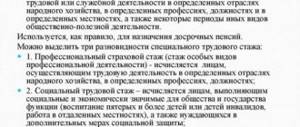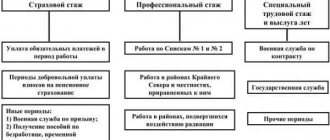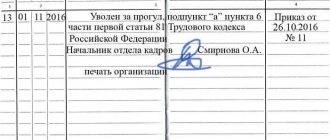Changes in labor legislation 2020: bills
2020 was a fruitful year for legislative initiatives in the field of labor law. Here are the most significant:
№748788-7. Amendments to the law on personalized accounting in the insurance pension system. Concerns the introduction of electronic work books.
№736455-7. Electronic document management with personnel. Provides the ability to submit job applications and conclude employment contracts digitally. Possible changes to the Labor Code of the Russian Federation for 2021 - the introduction of new articles 15.1–15.3.
No. 722526-7 . Changes to the Labor Code of Articles 133 and 133.1 regarding the inclusion of certain payments in wages when applying the minimum wage.
№755304-7. Concerns the employer's obligations to pay wages and other amounts. Affects articles TC 357 and 360.
Read all the information about changes in labor legislation in 2021 and innovations in personnel work in our new review.
Labor dispute and its resolution
We can talk about the effect of laws only if they find their application in real situations. And here it is impossible to do without an analysis of labor disputes and the legal basis for their resolution. The judicial practice of such serves as the main criterion for the viability of the Labor Code , including the practice of considering disputes by the Supreme Court of Russia, which is studied in legislative activity in the formation of labor law standards.
A labor dispute is the result of an incorrect and controversial interpretation of labor legislation by employees and employers or regulatory authorities. This is a consequence of the low level of legal literacy of Russians.
Law enforcement practice shows that courts, when considering labor disputes, consider the application of special labor law norms to be a priority (Federal Law No. 79-FZ of July 27, 2004). The correctness and effectiveness of resolving this category of disputes primarily depends on establishing the legal status of the employee himself, his direct function in the enterprise, the range of his rights, duties, as well as the provided liability.
One of the main roles is played by determining the nature of the labor relations that have arisen between the employer and the employee, which can be civil, special, contractual (based on an employment contract), etc.
Based on this, during judicial or extrajudicial settlement of a dispute, methods for its possible termination or completion will be determined, in the form of a court decision. It should be noted that labor disputes often arise due to violations of the procedure for registering the beginning of labor relations when hiring workers, the goal of which on the part of the employer is most often the desire to ease its tax burden and save money. At the same time, the employee’s ignorance of the rules for its registration is one of the reasons due to which such a situation becomes possible.
Important: If, when considering disputes in court, it is established that the concluded civil contract regulates the labor relations between the employee and the employer, then in such cases, to properly resolve the dispute, labor law norms must be applied (Article 11 of the Labor Code of the Russian Federation).
Labor Code of the Russian Federation for 2021: new minimum wage
From January 1, 2021, the federal minimum wage was 11,280 rubles.
For 2020, the Ministry of Labor increased it to 12,130 rubles. Reason: Order No. 561n dated 08/09/2019. This indicator is important: after the New Year, take it into account when calculating sick leave, payments under the BiR and other benefits.
This also means that from the beginning of 2021, employers cannot pay their employees less than 12,130 rubles. Otherwise - a fine according to the Code of Administrative Offences. By the way, there is also a lot of new stuff in the Code of Administrative Violations.
| Important! Remember that there are regions with regional coefficients. For example, for the Novosibirsk region the minimum wage = 12,130 x 1.25 = 15,162.5 rubles. |
A significant change in the Labor Code from 2021 concerns the inclusion of compensation payments in the minimum wage. If bill No. 722526-7 is adopted, it will be necessary to compare the net salary with the minimum wage, excluding compensation.
Changes to the Labor Code in 2021: new report to the Pension Fund and electronic work books
Replacing paper work books with electronic ones is one of the hottest topics of 2021. Now we can say with confidence that we are in the midst of a transition period. Since 2021, the Pension Fund of Russia began collecting electronic information about the labor activities of citizens. It is the responsibility of employers to submit a new report every month.
As of November 2019, bill No. 748744-7 was only approved in the first reading, but there are already changes in the Labor Code of the Russian Federation in connection with it. From January 1, 2021, employers must submit a new SZV-TD report to the Pension Fund on the 15th of each month - for the previous one. The first report on the new form must be submitted on February 17, 2020, since the 15th is a Saturday. Upon dismissal, employees should be given an SZI-TD certificate - with all changes in their working life during their work with a particular employer.
Throughout 2021, employee activity will be recorded in a dual format: in standard labor reports and in electronic reports to the pension fund. Starting from 2021, new paper work permits will no longer be issued. The existing ones will continue to be maintained only for those who write a statement about this in 2020.
There are already fines for violations.
Read more about the transition to electronic workbooks and new reports in the article.
Specifics of the Labor Code of the Russian Federation
Free legal consultation We will answer your question in 5 minutes!
Free legal consultation
We will answer your question in 5 minutes!
Ask a Question
Call: 8 800 511-39-66
Despite the significant differences in the structure of society in the seventies of the 20th century and the beginning of the 21st century, Federal Law No. 197 generally repeats many of the provisions of the Labor Code of 1971. The structures of these laws are also similar.
This is also important to know:
How to make a statement to the prosecutor’s office about non-payment of wages
However, the diversity of social and economic living conditions of people in modern Russia also affected legislation. The 2001 TC contains almost twice as many articles and chapters.
In terms of content, the Russian Labor Code differs from its Soviet-era predecessor not only in changes to the labor regime. It includes a large block regulating the work of people of special status and specific professions.
A special procedure for regulating labor activity is provided for:
- women, including pregnant women, those who have just given birth, and those with children under one and a half years old;
- workers who have adopted children;
- employees with disabled children;
- minor workers;
- heads of organizations;
- people working part-time or doing seasonal work;
- persons working on a rotational basis;
- those who are employed by individuals or micro-enterprises;
- people living in the Far North;
- foreigners and people without citizenship;
- teachers;
- scientists;
- diplomats;
- athletes and coaches;
- employees of religious organizations.
This list cannot be called complete, since it covers only the largest categories of legal entities. A special feature of the current code is the development of law towards maximum coverage of all areas of the labor market.
The fundamental difference between the Labor Code of the Russian Federation and previous versions of labor codes is the emergence of norms for regulating remote work. Despite the similarity of this category of workers with homeworkers, legislators quite rightly considered it necessary to highlight remote work in a separate chapter (49.1). Its number indicates the connection between the regulation of remote workers and homeworkers, because the chapter regulating the work of the latter has number 49.
This is also important to know:
What punishment is provided for absenteeism?
In connection with the legalization of remote work, the concept of an electronic signature appeared. There is even an entire federal law dedicated to this phenomenon, which is called “On Electronic Signatures” (Federal Law No. 63).
Thus, the Labor Code of the Russian Federation of 2001 is the result of the development of labor law from 1918 to the present day. It included standards for working conditions, contracts, hiring and dismissal of workers that have already become traditional. However, Federal Law No. 197 also contains fundamentally new objects of labor law, which is a reaction to changing labor market conditions.
New "children's" benefits
Important changes to the 2021 Labor Code of the Russian Federation will occur on January 1, 2021 and with the entry into force of Law No. 305-FZ of 08/02/2019 . This act amends the law on monthly payments to families with children. Now a parent who cares for a child under 3 years old can count on a benefit in the amount of the subsistence minimum for a child. Previously, they were limited to one and a half years.
The rule applies to socially vulnerable families whose income per person does not exceed two subsistence minimums.
Changes regarding scheduled inspections
Law No. 130-FZ of June 6, 2019 added to the list of enterprises that are not subject to the small business moratorium, and to which government agencies can conduct inspections more often than once every three years.
Now this list also includes companies involved in the production, use or circulation of precious metals and precious stones.
| Important! The schedule of scheduled inspections is approved by the Prosecutor General's Office. It becomes open at the end of each year. You can check whether you can expect a state inspection in 2020 here. |
Additional guarantees for rural workers
In November 2021, the procedures for considering bill No. 611690-7 were completed. The result is Law No. 372-FZ of November 12, 2019 , which makes the following changes to the Labor Code of the Russian Federation:
- Article 262 has been edited .
- A new article 263.1 . Now rural workers receive the right to an additional (unpaid) day off, a shortened 36-hour work week, and increased pay for positions where the working day is divided into parts.
The order of acceptance to work
Employment of a citizen of any status is carried out in accordance with the written order of the head of the business entity.
The document is issued within three days from the date of commencement of work. The basis for its preparation is a person’s application with a request to be hired. The order displays full information about the nature of the labor relationship. It indicates the date from which the person got a job, his profession or position, working hours and salary. The order confirms the fact that the person is employed. Its text part must be drawn up in accordance with the Labor Code of the Russian Federation and synchronized with the provisions of the employment contract. The presence of contradictions is a legal violation.
Categories of workers for whom the reduced working hours regime is applicable
The employee must familiarize himself with the order, which is certified by the employer and the company’s seal, if this is provided for by the internal regulations on office work. A copy of the document is provided to the employee, who must put his signature on the original, indicating the transfer of the paper.
New fines under the Code of Administrative Offenses
Law No. 221-FZ of July 26, 2019 amended Article 5.27 of the Code of Administrative Offences, the main section of administrative fines relating to labor legislation. Starting from 2021, employers who do not allow their employees to change payroll organizations face a fine of up to 50,000 rubles.
Article 11.23 has been revised . New fines have been introduced for violating work and rest hours and driving certain vehicles without a tachograph. Now drivers and officials responsible for equipping cars with tachographs and maintaining operating conditions are subject to punishment separately. Reason: Law No. 216-FZ of July 26, 2019. It also provides for penalties for employers whose drivers do not rest properly.
Changes to labor legislation - what needs to be done before the end of 2021
The main feature of work in the field of personnel is that one change in labor legislation entails numerous changes in practical work. What to do before 2020:
- Change the LNA and job descriptions (JI) of personnel officers - due to the need to submit a new report to the Pension Fund of the Russian Federation.
- Prepare application templates for maintaining work books on paper - in connection with the transition to electronic work books.
- Make changes to the DI of drivers and technical service workers - in connection with new fines for violating labor regulations and traveling without tachographs.
- Prepare a vacation schedule taking into account new benefits for parents with many children.
What compensation payments does Art. 129 of the Labor Code of the Russian Federation?
In addition to remuneration for labor, the legislation provides for compensation payments - elements of remuneration intended to reimburse the employee for the costs incurred in connection with the performance of his labor function.
Art. 129 of the Labor Code of the Russian Federation does not contain a specific list of such payments. These include:
- additional payments for work in conditions deviating from normal (difficult, harmful, dangerous, etc.);
- payments for work in special climatic conditions;
- additional payments for combining professions (positions);
- additional remuneration for expanding service areas, overtime work, night work, weekends and holidays, etc.
Study the nuances of compensation payments using materials from our website:
- “Work at night according to the Labor Code (nuances)”;
- “How does the additional payment for substitution during vacation work?”.
Changes in the labor code from 2021: we remind you of the most important
The past year has made many amendments to the work of personnel officers. Let us recall the main points related to changes and additions to the Labor Code of the Russian Federation in 2021.
New rules for vacation distribution
Previously, parents with many children did not have an unconditional right to leave at any convenient time.
Starting from 2019, it is necessary to take into account the family status of employees when drawing up an annual vacation schedule: the updated version of the Labor Code of the Russian Federation has come into force. New Article 262.2 aims to protect workers with family responsibilities. It allows parents of three or more children under the age of 12 to take annual paid leave at a time convenient for them, and not for the employer.
Additional days off for regular medical examinations
A healthy worker is an effective worker. This formula best describes changes in labor legislation in 2021 aimed at protecting the life and health of working citizens. Law No. 353-FZ of October 3, 2018, which entered into force, obligated all employers, without exception, to provide and pay each employee an additional day off for medical examination (at least once every three years).
A special medical examination procedure is provided for working pensioners and pre-retirees. The older a person is, the higher the risk of developing acute and chronic diseases. Therefore, if the organization has employees of retirement or pre-retirement age, provide them with at least two days annually for routine medical examinations.
Fines for special assessment and completion of the transition period
In 2019, the transition period ended, during which some companies and individual entrepreneurs that did not carry out special assessments were not threatened with penalties. But from January 1, 2021, jobs left without a special assessment will come under the close attention of GIT inspectors. And an employer who violates the law may be fined.
Fines:
- From 60,000 to 80,000 rubles - for a legal entity.
- From 5,000 to 10,000 rubles - for an official or individual entrepreneur.
| Important! The requirement for mandatory special assessment does not apply to remote and home-based jobs. |
Latest changes in labor legislation related to foreigners
The tightening of migration legislation also affected the sphere of hired labor. Until January 16, 2021, employers hiring foreigners were not responsible to the state for them.
Now, when hiring a foreign worker, a company or individual entrepreneur is obliged to ensure that his occupation corresponds to the purpose of entry, and to control the timeliness of leaving the country.
Fines for non-compliance with the new standards:
- Up to 500,000 rubles - to legal entities.
- Up to 50,000 rubles - for officials and individual entrepreneurs.
Thus, the illegal stay of a foreign worker on the territory of the Russian Federation can result in large financial losses for the employer who invited him.
The Pension Fund no longer issues SNILS
From April 1, 2021, the pension fund stopped issuing the usual yellow SNILS cards.
Instead of them - electronic extracts from the Pension Fund . When drawing up a contract with a new employee, accept them without requiring a paper version. But if a person brings an old SNILS, accept it too, it has power.
Read about electronic SNILS here.
History[ | ]
Labor legislation of the New Age[ | ]
Main article: Factory legislation of the Russian Empire
The formation of labor law in Russia begins in the 18th century and is associated with the development of the mining industry during this period. The “Factory Charter” prepared by V.N. Tatishchev dates back to the same time (not adopted) [1].
However, labor law began to fully develop in the 19th century. Labor law of this period is characterized by its coverage of predominantly factory relations (this is where the second name of labor law in this period comes from: factory legislation). During this period, laws were issued in 1882 and 1885 (mainly related to child labor), as well as the “Rules on mutual relations between manufacturers and workers” (1886). The law of 1897 was of great importance, limiting the working day to 11.5 hours. The most complete act of this period, which reflected labor relations, was the “Charter on Industrial Labor” (1913), which approved, in particular, the rules for hiring, as well as the procedure for supervising compliance with labor (then factory and mining) legislation.
Labor law in the Soviet period[ | ]
ex 1918[ | ]
The first Russian labor law was adopted by the Bolsheviks in 1918. The main task of the ex was to regulate the relationship between the worker and the employer[2].
Ex introduced the following concepts:
- workers
- persons working for remuneration; - remuneration for labor
- provided in the form of money, services (for example, provision of housing) or products (including food); - subsistence minimum
- the minimum remuneration for work established for a given area; - preliminary test
- a certain period preceding the final admission to long-term work; - normal working hours
- the time established for the production of this work by tariff regulations; - shift work
- continuous work that requires several shifts of work; - overtime work
- work beyond normal working hours, allowed in exceptional cases; - holidays
- established days on which work is not performed; - production rate
- the amount of work established by the pricing commission and approved by the labor department, performed under normal conditions during normal working hours; - labor inspection
- a body that protects the life, health and labor of persons engaged in economic activities; - labor distribution department
- a body responsible for registering the unemployed and providing them with jobs.
The first act introduced the following duties of workers:
- labor service
is the duty of every citizen of the RSFSR; - personal work book
- a document with notes on work performed, remuneration and benefits received; - the possibility of attracting the adult male working population to overtime work;
- performing a quantity of work not less than the established production standards
; - compliance with internal regulations
; - notification to the force distribution department and the trade union about the fact of replacement in the workplace of a worker who left the workplace without permission.
The following workers' rights were declared:
- the right to work
- the right to use labor in one’s specialty and for an established remuneration; - remuneration for work is not lower than the established subsistence level;
- receiving remuneration for work at least once every two weeks;
- the possibility of dismissal at one's own request (in fact, this right was eliminated by the need to justify the reason for dismissal, which would satisfy the body of workers' self-government);
- The duration of normal working hours is no more than 8 day or 7 night hours per day.
- reduced working hours for persons under 18 years of age;
- reduced working hours in hard and hazardous work;
- lunch break;
- additional break for breastfeeding babies;
- weekly uninterrupted rest for at least 42 hours;
- shortened working day before a day of rest;
- annual leave;
- cash benefits and free medical care in case of illness, pregnancy and childbirth;
- unemployment benefits in the amount of remuneration due to the worker for work according to his tariff, group and category;
- benefits for workers working outside their specialty.
The Ex explicitly prohibited workers from working during annual leave and on holidays, and limited the length of the working day to 8 hours during the day and 7 hours at night [2] (for the first time, an 8-hour working day was established by decree of October 29 ( November 11) 1917, and before that, according to the law of June 2, 1897, the working day was limited to 11.5 hours [3]). When the fact of such work was established, the remuneration he received was withheld from the worker. It was also prohibited to receive additional remuneration for work other than for normal working hours and overtime. Payment of labor in advance was prohibited.
The following funds were introduced:
- Unemployment Insurance Fund;
- Local health insurance funds.
Four years later, in 1922, the ex was revised.
ex 1922[ | ]
The second ex was adopted by a resolution of the All-Russian Central Executive Committee signed by M. Kalinin, People's Commissar of Labor V. Schmidt, and Secretary of the All-Russian Central Executive Committee Enukidze in November 1922. The new ex of 192 articles reflected the course of the New Economic Policy adopted in 1921, as well as aspects of the labor activity of citizens, many of which have survived to the present day[4].
Compared to the previous EX, new concepts were introduced, such as:
- collective agreement
; - employment contract
; - pay book
; - artel
; - severance pay;
The ex established an 8-hour working day, continuous rest of at least 42 hours[5], and an annual regular paid 2-week vacation. The exploitation of child labor (under 16 years of age) was prohibited. For women, exemption from work was provided for the period before and after childbirth: 6 weeks before and 6 weeks after for mental workers, 8 weeks for manual workers. Additional breaks (except for lunch) were introduced for feeding infants. The concept of night time was defined - from 10 pm to 6 am.
The Ex established a list of public holidays, and also introduced the concept of the professions of “office and mental work.” There was no old-age pension, instead there was only a “right to social security for disability.”
With some amendments, the ex was in effect for almost half a century.
ex Labor Laws of 1971 (LLC)[ | ]
In 1971, a new ex was adopted, which established a 41-hour work week, added new holidays and new benefits, including establishing the right to parental leave until the child reaches 3 [ source not specified 3825 days
] years with job security. The new ex was softer compared to the 1922 ex.
Expired February 1, 2002.
What's planned
Several bills are still at various stages of development. If they are approved at the end of 2019 or the beginning of 2020, several more innovations await us.
New deadlines for vacation pay
Employers may have even less time to pay holiday pay. Now this must be done no less than 3 calendar days. If the amendment to Article 136 of the Labor Code of the Russian Federation passes, the deadline will change by 3 working days.
That is, if a person goes on vacation on Monday, vacation pay will have to be paid not on Thursday, as now, but on Tuesday.
The bill was ready at the beginning of 2019, but has not yet even been included in the plan for consideration by the State Duma. This means that from the beginning of 2020 we are paying holiday pay in the old way.
Postponement of Russia Day
Rumors about a new date for the state holiday have been circulating for a long time. Bill No. 304843-7 proposes a postponement from June 12 to September 12.
In 2019, the act was adopted for consideration in the first reading, but the decision on it was postponed several times.
Enforcement of obligations to pay wages
In November 2019, bill No. 755304-7 was approved by the State Duma in the second reading. This means that in 2020, Article 357 will undergo changes to the Labor Code. A new one will also appear - 360.
The essence of the adjustments is that if the employer does not comply with the order to pay delayed wages, the State Tax Inspectorate can transfer the case to the bailiffs. The money will be forcibly confiscated.
Current employment certificate[ | ]
The new labor law was adopted in 2001 and came into force in 2002. According to trade unions, this law provides for an increase in overtime working hours (both the working week and the working day), as a result of which the number of accidents with “overtime” drivers has increased [6]. Trade unions have finally lost the opportunity to both represent the interests of workers and resist mass layoffs[7]. At the same time, the ex introduced a ban on dismissal during illness or vacation, as well as dismissal without payment of two months' salary[8]
In the fall of 2010, the Russian Union of Industrialists and Entrepreneurs (Shokhin) developed amendments to the Russian Labor Code to combat the crisis and unemployment and proposed increasing the working week to 60 hours and the working day to 12 hours.[9][10] According to the current law, the working week cannot exceed 40 hours; the current law does not establish requirements for the length of the working day (with the exception of certain categories of workers).
New concepts of “remote work” (Remote work) and, accordingly, “remote workers” have been introduced. Amendments have also been made to the Law on Electronic Signature[11] to facilitate the process of signing an Employment Agreement with this kind of employees: “An employment agreement on remote work and agreements to change the terms of the employment agreement on remote work determined by the parties can be concluded by exchanging electronic documents.” At the same time, the employer is obliged, within 3 working days after the exchange of electronic signatures, to send his employee a copy of the TD, duly executed, by registered mail with notification. // “Chapter 49. Peculiarities of regulating the labor of remote workers” // Federal Law of the Russian Federation of April 5, 2013 N 60-FZ[12].







